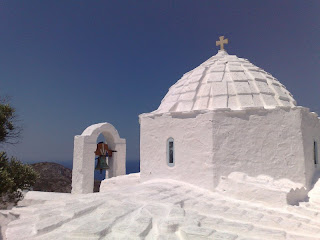It was supposed to be a quiet Sunday lunch at the waterfront taverna.
 |
| Spiros, the taverna's resident pet |
We've just finished our chilled watermelon and we're preparing to spend a leisurely afternoon watching the world go by, when we notice something odd about Makarma, anchored out in the bay. Her bow is falling off the wind but is not being pulled back up again by the anchor chain. Her anchor can't be dragging, can it?
As we watch in mounting horror, she drifts off in the gusty breeze trailing the anchor and 40 metres of chain. She is soon picking up speed across the bay. Oh my god! Leighton throws some money on the table and we sprint for the dinghy to race after her. Makarma meanwhile narrowly misses a large motorboat and is sliding sideways towards the bows of an Australian sailing boat.
Our progress in the dinghy feels agonisingly slow as we watch the drama unfold. We're helpless to do anything about the inevitable collision. Come on, we urge the outboard. This is the moment we're starting to regret exchanging our old 10hp engine for a sluggish 2.5hp.
By the time we reach her, Makarma is pinned on the bow of the yacht with our man-overboard A-frame caught in its pulpit. A guy from the motorboat is using his tender as a tug, trying to push us off. Back onboard at last, we help the yacht's owner disentangle us from his bow and Leighton gets the engine started in record time to reverse us out of harm's way.
After we get re-anchored and the adrenalin's stopped pumping we wonder how on earth it happened. We have huge confidence in our 20kg Bugel which doesn't usually let us down. This time we've been anchored here for three days in strong wind and we've checked every day that our anchor is still well dug in. The only possible explanation we could come up with was a boat anchored very close to us left while we were ashore and disturbed our anchor.
Whatever the reason, the incident has a happy outcome. When Leighton went over to apologise to the Aussies and check they were OK they generously invite us over. Mike and Sue on Skedaddle Again, who we'd - literally! - bumped into have no hard feelings. To our relief, no damage has been done to either boat either. Although we wouldn't choose to meet people this way, we're glad we have.
 |
| At anchor as she should be |























